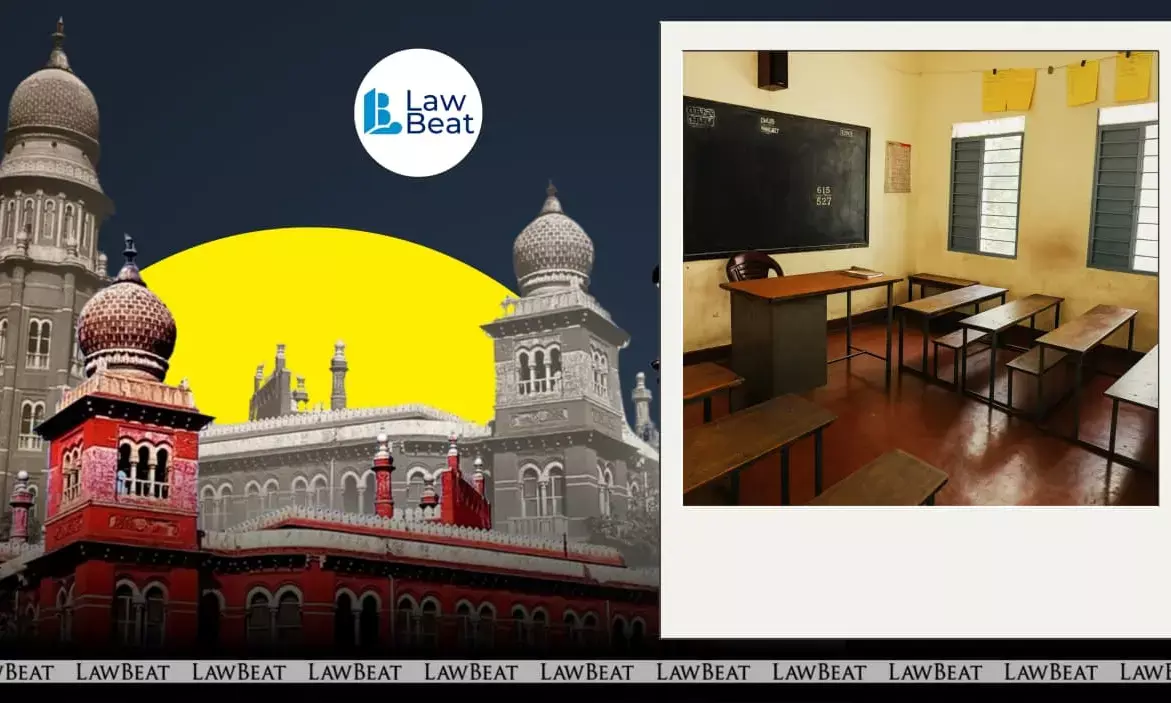Corporal Punishment in Schools: Madras High Court Rejects Compensation Claim

X
The Madras High Court notes that Tamil Nadu has implemented guidelines against corporal punishment
Court said that the parent's grievance had already been addressed, and no payout was warranted
The Madras High Court recently dismissed a writ petition filed by a parent seeking compensation from the Tamil Nadu School Education Department for its alleged inaction on his complaint regarding corporal punishment in schools.
While rejecting the compensation claim, the high court recorded that the state has already implemented nationwide guidelines to eliminate corporal punishment, following interim directions issued earlier in the case.
The petition, filed by Kamatchi Shanker Arumugam, father of a Class IV student, challenged the alleged inaction of education authorities after his daughter, Naanaaru Ridhanya, was involved in a classroom incident at Panchayat Union Middle School, Bodipatti, Tiruppur District. According to the petition, when the class teacher stepped out briefly, the girl, acting as class leader, hit another child. The parent of the affected student later confronted Arumugam at his residence, leading him to file a grievance petition on September 7, 2023 seeking strict enforcement of child protection norms.
Appearing in person, the petitioner urged the court to direct the state to implement the National Commission for Protection of Child Rights’ (NCPCR) Guidelines for Elimination of Corporal Punishment in Schools (GECP) across all schools in Tamil Nadu. He further sought nominal compensation for each day of delay beyond the 30-day grievance redressal period stipulated under Government Order (Ms) No. 73 dated June 11, 2018.
In an interim order dated April 23, 2024, Justice G.K. Ilanthiraiyan had emphasised that corporal punishment of any form is unacceptable and prohibited under Section 17 of the Right to Education Act, 2009. The court had observed that children must grow in a safe and caring environment and should not be subjected to physical or mental harassment. “Patience is the key quality required for handling children,” the order stated, adding that the state has a constitutional duty under Article 39(f) to safeguard the welfare of children.
The court had then directed the School Education Department to implement the NCPCR guidelines in all institutions across the state. It had ordered awareness programmes, monitoring committees in each school, and disciplinary proceedings against officials found negligent.
The Director of School Education and Director of Elementary Education subsequently issued proceedings on April 26, 2024, circulating instructions to all Chief Educational Officers and District Education Officers for compliance.
When the matter was heard on September 19, 2025, the government informed the court that the petitioner’s grievance had already been addressed. An enquiry was conducted by the Block Education Officer, Udumalpet, who sought explanations from the class teacher and headmaster. They were instructed to adhere to constitutional and legal norms regarding child protection. On this basis, the state argued that the petitioner was not entitled to compensation.
Justice Ilanthiraiyan, agreeing with the state’s position, held that the grievance had indeed been acted upon and that compensation was not warranted. The court noted that grievance petitions must ordinarily be acknowledged within three days and disposed of within a month, but in this case remedial steps were taken after judicial intervention.
“Since the grievance of the petitioner has been duly addressed, there is no question of awarding compensation,” the court said, dismissing the writ petition without costs.
Case Title: Kamatchi Shanker Arumugam vs. Tamil Nadu School Education Department and Others
Order Date: September 11, 2025
Bench: Justice G.K. Ilanthiraiyan
Next Story
